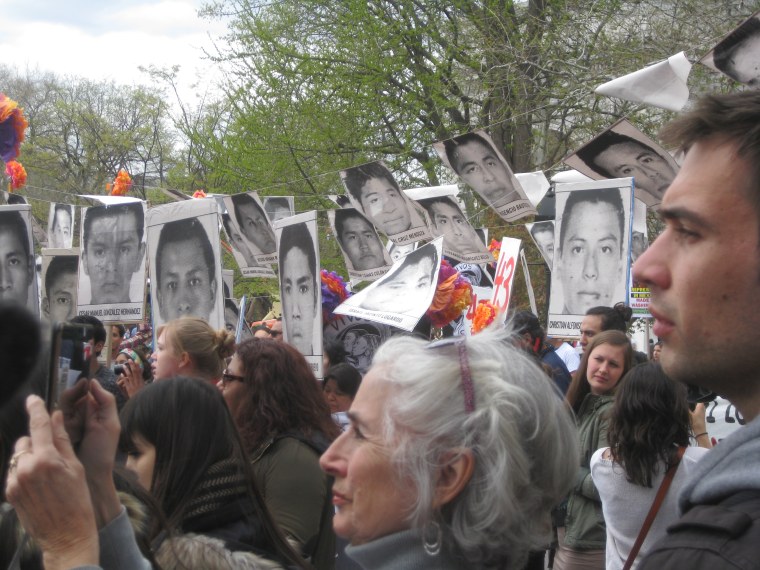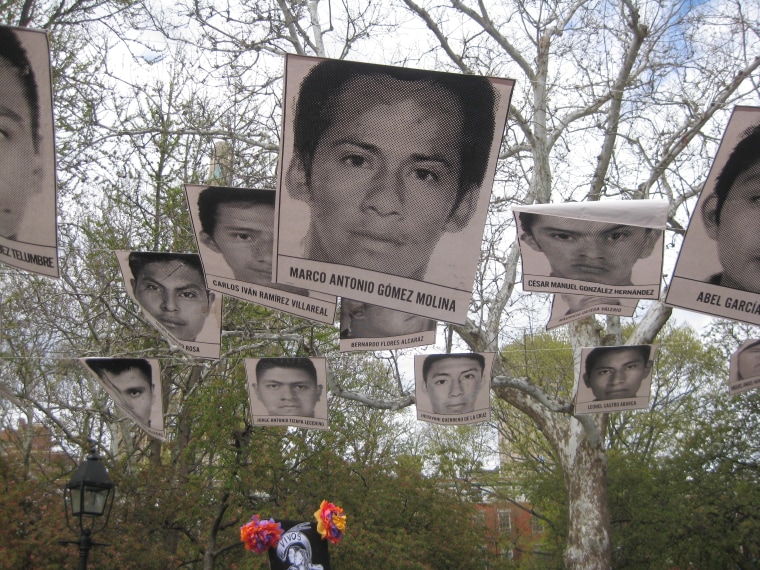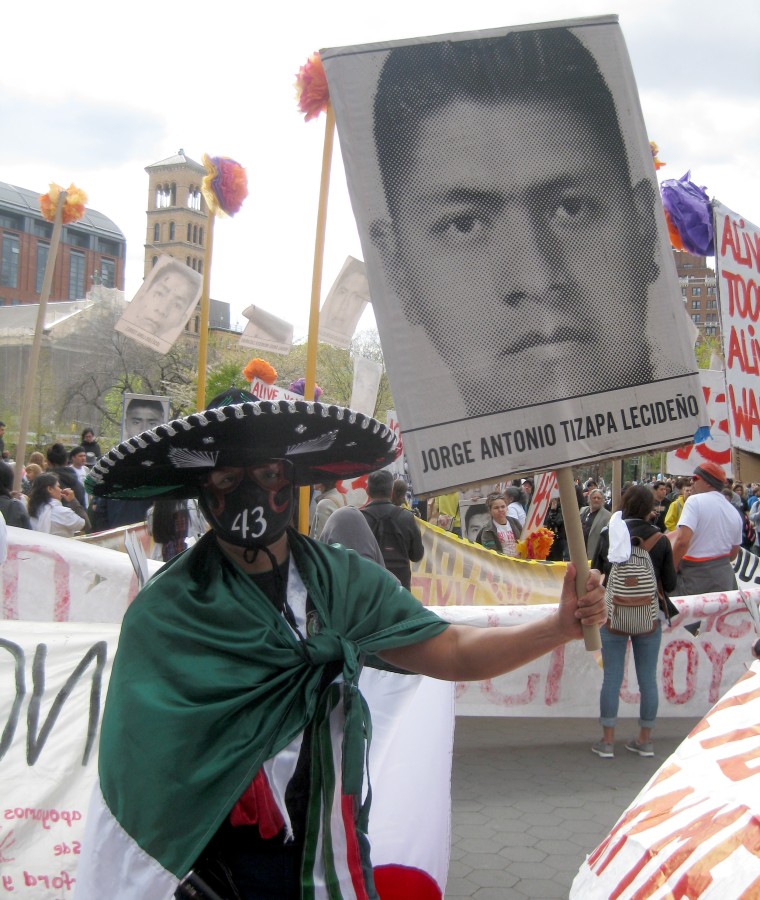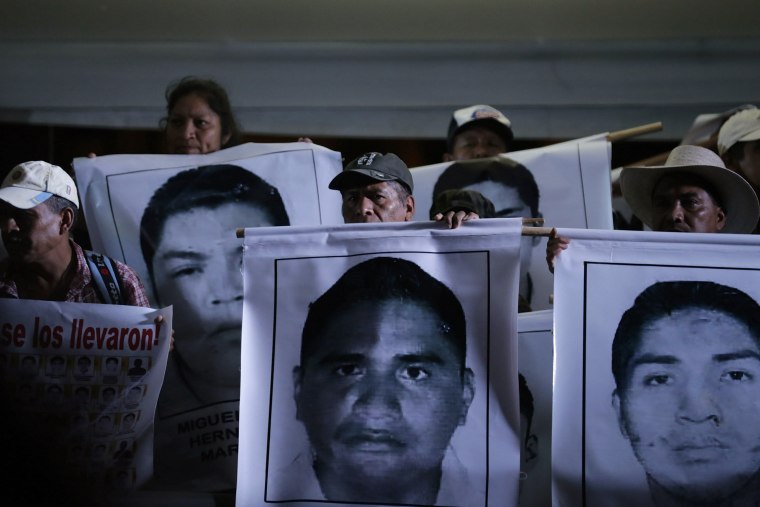NEW YORK, NY --In the next few days, Americans will see the images of Pope Francis making his way through U.S. institutions and landmarks: the White House, Congress, New York City's Saint Patrick's Cathedral and the September 11 Memorial, as well as Independence Mall in Philadelphia. But for many, the question is whether the Pope's words and message can influence change in the U.S. and abroad.
For five indigenous mothers who traveled almost 2,000 miles from Ayotzinapa, Mexico and who are following the Pope’s 6-day U.S. itinerary with the hope of meeting him, they believe he can.
“We want him [the Pope] to speak out in favor of Ayotzinapa,” said Hilda Legideño, one of the mothers of the 43 students who went missing on September 26, 2014. "As a representative of God, we ask him to support us and speak with the President [of Mexico] to find our sons,” she said in a phone interview with NBC News before her arrival to Washington, D.C.
Last week, Mexico’s Attorney General said that forensic experts identified the remains of Jhosivani Guerrero de la Cruz, the second out of 43 Ayotzinapa students who went missing. Testimonies from the “night of terror” drove Mexicans worldwide to protest government corruption and organized crime.

“We ran, knocking on doors, asking for help” said Ángel de la Cruz—one of the students who survived the mass kidnapping—to Telemundo, NBC’s Spanish language affiliate. The Mexican government says that the 43 missing students were detained by local police from Iguala and Cocula at the behest of the mayor and his wife, and handed over to Guerreros Unidos (United Warriors), a drug gang who then killed them and incinerated their bodies at a garbage dump.
Ayotzinapa parents, however, maintain that their sons are alive. And a recent independent report by the Inter-American Commission on Human Rights rejected Mexico’s official account, stating that there was no evidence that the 43 missing students were incinerated at the dump.
Other sources also contest the validity of evidence presented by the Mexican government in the case. Telemundo reports that while video footage from 21 out of 25 surveillance cameras in Iguala is not available, a witness recorded audio of the police shootout on the night of the disappearance.
The five Ayotzinapa mothers following Pope Francis hope that he can pressure the Mexican government to find justice. The Pontiff—who is widely regarded as the leader of the people—has already engaged the church in other social issues, including poverty, immigration and climate change. And Latinos, who make up 43 percent of U.S. Catholics, might see the Pope’s human rights advocacy as a positive change.
The Pontiff is also particularly significant to the mothers because he has taken up the cause of indigenous peoples in South America. “I humbly ask forgiveness, not only for the offenses of the Church herself, but also for crimes committed against the native peoples during the so-called conquest of America,” he said in a July speech during his visit to Bolivia.

But critics in the U.S. point out that the Pope’s decision to canonize Junípero Serra—an 18th century Spaniard who founded a series of missions in modern-day California—contradicts his advocacy. Native American groups say that the Spanish missionary tortured and detained indigenous people before converting them.
In spite of this polemic, Latino supporters defend the Pope’s commitment to human rights, tracing his social ideals back to early church reformers like Bartolomé de las Casas—a 16th century Dominican friar who denounced attrocities committed by Spanish colonialists against Native Americans. The Pontiff’s perspective was also influenced by the Jesuits, the Catholic religious order that ordained him as a priest. In the mid- to late 18th century, the Jesuits opposed Pope Clement XIV, who sided with European monarchs against independent idigenous communities in South America.
Pope Francis’ core social values can be seen in his second encyclical letter "Laudato Si" (Praise Be to You) to Catholic churches. “The human person grows more, matures more and is sanctified more to the extent that he or she enters into relationships,” he wrote last May. And this “communion” with God and people is the cornerstone of the pontiff’s solidarity.

For the Ayotzinapa families and many Catholics, the success of Pope Francis’ legacy of change will depend on his ability to bring people together—connect them through faith and issues, and renew the old network of the church.
On Tuesday, Cristina Bautista Salvador, an Ayotzinapa mother in Mexico, told NBC News over the phone that Mexican police in riot gear had used tear gas to block buses carrying families and supporters of students from going to a protest.
“We are not crazy,” said Hilda Hernández, one of the five Ayotzinapa mothers following the Pope in the U.S., in a phone interview with NBC News. “As Mexican citizens we want to see our sons alive again… and even though we come from different places… speak different languages… we are brothers and sisters… we are [all] the same—human.”
